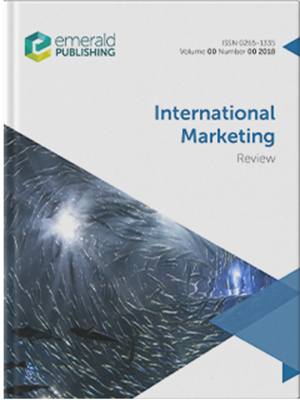The impact of dialectical thinking on androgynous brand equity across cultures: the moderating role of brand positioning
IF 4.6
3区 管理学
Q1 BUSINESS
引用次数: 0
Abstract
PurposeThe authors’ research examines the impact of cross-cultural difference in dialectical thinking on consumers' responses to androgynous brands and its implication for brand equity. Their research also aims to see how consumers take both feminine and masculine attributes into consideration to form their judgments of androgynous brand equity and whether this process is moderated by brand positioning.Design/methodology/approachThe authors did two experiments with 400 Chinese consumers (high in dialectical thinking) and 528 British consumers (low in dialectical thinking) to test our framework.FindingsThe authors’ experimental results suggest an androgynous brand has higher brand equity in China than in the UK. Furthermore, Chinese consumers rate higher feminine/masculine attributes of masculine/feminine brands. In addition, an androgynous brand's equity is mainly driven by its less dominant attributes. Finally, their results suggest that brand positioning moderates the mediating role of less dominant attributes, more evident when brand positioning matches (vs mismatches) an androgynous brand's more dominant attributes.Originality/valueBy focusing on cross-cultural differences in dialectical thinking, the authors’ research offers a novel approach to reconcile existing inconclusive results on androgynous brand equity. Second, to their best knowledge, their research is the first to examine how feminine and masculine attributes jointly decide androgynous brand equity. Finally, by focusing on brand positioning, their research highlights the importance of an androgynous brand's less dominant attributes in driving its brand equity and provides a tool international marketing managers can use to strengthen such influence.辩证思维对跨文化中性品牌资产的影响:品牌定位的调节作用
目的研究辩证思维中的跨文化差异对消费者对中性品牌反应的影响及其对品牌资产的影响。他们的研究还旨在了解消费者如何将女性和男性属性考虑在内,从而形成他们对中性品牌资产的判断,以及这一过程是否受到品牌定位的调节。设计/方法论/方法作者对400名中国消费者(辩证思维水平高)和528名英国消费者(辩证思考水平低)进行了两项实验,以测试我们的框架。作者的实验结果表明,中性品牌在中国的品牌资产高于英国。此外,中国消费者对男性/女性品牌的女性/男性属性评价更高。此外,一个雌雄同体的品牌的资产主要是由其不太占主导地位的属性驱动的。最后,他们的研究结果表明,品牌定位调节了不太占主导地位的属性的中介作用,当品牌定位与中性品牌的更占主导地位属性匹配(vs不匹配)时,这种作用更为明显。独创性/价值通过关注辩证思维中的跨文化差异,作者的研究提供了一种新的方法来调和关于中性品牌资产的现有不确定结果。其次,据他们所知,他们的研究首次考察了女性和男性属性如何共同决定雌雄同体的品牌资产。最后,通过关注品牌定位,他们的研究强调了中性品牌不太占主导地位的属性在推动其品牌资产方面的重要性,并提供了一个国际营销经理可以用来加强这种影响力的工具。
本文章由计算机程序翻译,如有差异,请以英文原文为准。
求助全文
约1分钟内获得全文
求助全文
来源期刊

International Marketing Review
BUSINESS-
CiteScore
8.70
自引率
12.00%
发文量
55
期刊介绍:
International Marketing Review (IMR) is a journal that has, as its core remit, the goal of publishing research that pushes back the boundaries of international marketing knowledge. IMR does this by publishing novel research ideas, and by publishing papers that add substance to, question the basic assumptions of, reframe, or otherwise shape what we think we know within in the international marketing field. IMR is pluralistic, publishing papers that are conceptual, quantitative-empirical, or qualitative-empirical. At IMR, we aim to be a journal that recognizes great papers and great research ideas, and works hard with authors to nurture those ideas through to publication. We aim to be a journal that is proactive in developing the research agenda in international marketing, by identifying critical research issues, and promoting research within those areas. Finally, IMR is a journal that is comfortable exploring, and that fosters the exploration of, the interfaces and overlaps between international marketing and other business disciplines. Where no interfaces or overlaps exist, IMR will be a journal that is ready to create them. IMR’s definition of international marketing is purposefully broad and includes, although is not restricted to: -International market entry decisions and relationships; -Export marketing and supply chain issues; -International retailing; -International channel management; -Consumer ethnocentrism, country and product image and origin effects; -Cultural considerations in international marketing; -International marketing strategy; -Aspects of international marketing management such as international branding, advertising and new product development.
 求助内容:
求助内容: 应助结果提醒方式:
应助结果提醒方式:


